八年级上册英语课堂笔记
初二上册英语书笔记
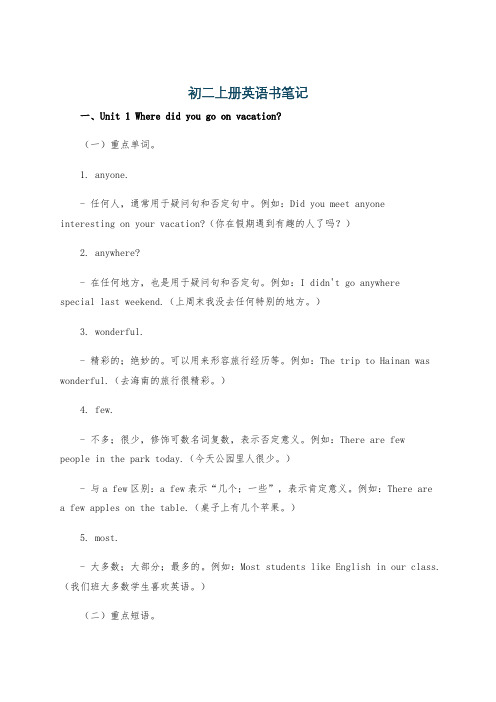
初二上册英语书笔记一、Unit 1 Where did you go on vacation?(一)重点单词。
1. anyone.- 任何人,通常用于疑问句和否定句中。
例如:Did you meet anyone interesting on your vacation?(你在假期遇到有趣的人了吗?)2. anywhere?- 在任何地方,也是用于疑问句和否定句。
例如:I didn't go anywherespecial last weekend.(上周末我没去任何特别的地方。
)3. wonderful.- 精彩的;绝妙的。
可以用来形容旅行经历等。
例如:The trip to Hainan was wonderful.(去海南的旅行很精彩。
)4. few.- 不多;很少,修饰可数名词复数,表示否定意义。
例如:There are few people in the park today.(今天公园里人很少。
)- 与a few区别:a few表示“几个;一些”,表示肯定意义。
例如:There are a few apples on the table.(桌子上有几个苹果。
)5. most.- 大多数;大部分;最多的。
例如:Most students like English in our class.(我们班大多数学生喜欢英语。
)(二)重点短语。
1. go on vacation.- 去度假。
例如:They went on vacation in Paris last year.(他们去年去巴黎度假了。
)2. stay at home.- 待在家里。
例如:I stayed at home and watched TV yesterday.(我昨天待在家里看电视了。
)3. go to the mountains.- 去爬山。
例如:We went to the mountains and had a great time.(我们去爬山了,玩得很开心。
牛津译林版八年级英语上册8AUnit1课堂笔记
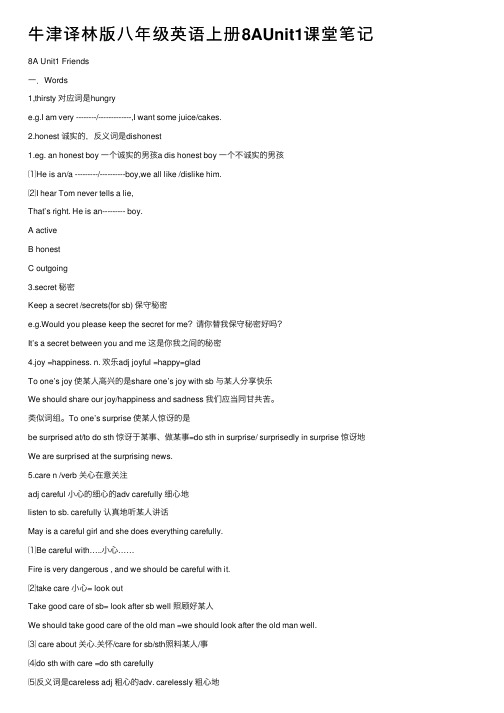
⽜津译林版⼋年级英语上册8AUnit1课堂笔记8A Unit1 Friends⼀.Words1,thirsty 对应词是hungrye.g.I am very --------/-------------,I want some juice/cakes.2.honest 诚实的,反义词是dishonest1.eg. an honest boy ⼀个诚实的男孩a dis honest boy ⼀个不诚实的男孩⑴He is an/a ---------/----------boy,we all like /dislike him.⑵I hear Tom never tells a lie,That’s right. He is an--------- boy.A activeB honestC outgoing3.secret 秘密Keep a secret /secrets(for sb) 保守秘密e.g.Would you please keep the secret for me?请你替我保守秘密好吗?It’s a secret between you and me 这是你我之间的秘密4.joy =happiness. n. 欢乐adj joyful =happy=gladTo one’s joy 使某⼈⾼兴的是share one’s joy with sb 与某⼈分享快乐We should share our joy/happiness and sadness 我们应当同⽢共苦。
类似词组。
To one’s surprise 使某⼈惊讶的是be surprised at/to do sth 惊讶于某事、做某事=do sth in surprise/ surprisedly in surprise 惊讶地We are surprised at the surprising news.5.care n /verb 关⼼在意关注adj careful ⼩⼼的细⼼的adv carefully 细⼼地listen to sb. carefully 认真地听某⼈讲话May is a careful girl and she does everything carefully.⑴Be careful with…..⼩⼼……Fire is very dangerous , and we should be careful with it.⑵take care ⼩⼼= look outTake good care of sb= look after sb well 照顾好某⼈We should take good care of the old man =we should look after the old man well.⑶ care about 关⼼.关怀/care for sb/sth照料某⼈/事⑷do sth with care =do sth carefully⑸反义词是careless adj 粗⼼的adv. carelessly 粗⼼地11.6.humourous adj 幽默的n humour12.have a (good) sense of humour = be (very) humorous (很)有幽默感a sense of ... ......感Max has a good sense of ------------(幽默) and often tells us funny jokes.She is very ---------(幽默)and often ------------(make) them laugh.7,polite有礼貌的反义词是impolitebe polite to sb 对某⼈⼜礼貌的adv politely 礼貌地we should speak to the old man -------------(polite)8.tidy 整洁的⽐较级是------------ 最⾼级是------------------We should keep our classroom clean and tidy.The park is becoming tidier and tidier.9 make 成为,适合使….⑴make sb do sthThe boss made the children -------(work) for 12 hours a day in the past.⽤动词原形的有help/ let sb do sth had better (not ) do sth. Would /Could/will/ can you please do sth ……? Why not do sth ?类似于make⽤不带to 的动词原形做宾语补⾜语的动词有以下⼏类⼀感:feel⼆听:listen to ,hear三让:let, make, have四看:watch, look at ,see ,noticeeg (often ) see sb do sth ;see sb doing when sb ……⑵make sb/sth adj/n 使某⼈、事怎么样Life here makes me very happy.⑶make/ think/ find/ believe it adj to do sth使、认为、发现、相信做某事是…….They make it interesting to do the boring work.I think it important to learn English.They found the film very boring.⑷make sb sth /sth for sb 为某⼈制作某物Two men made the king the new clothes/the new clothes for the king.⽤法相同的词语有draw cook get buy sing sb sth /sth for sbgive show send bring pass sb sth /sth to sb10, trust信任I trust you.我信任你trust in sb/ sth相信,信任,信赖某⼈、事she needs to trust more in her abilities她需要更加相信⾃⼰的能⼒区别于believe 相信,认为真实,及物动词Do you believe me?规则撒谎,不规则躺躺过下蛋,下蛋不规则Eg⑴At the foot of the mountain -----------------------------(lie) a village⑵The hens -----------50 eggs last week.⑶The girl --------on the ground ---------- to me ,that she had -----------the purse on the desk 2.Language points:(1)some表⽰“⼀些”的⽤法:⑴some常⽤于肯定句和肯定回答中;否定句及疑问句中常⽤any来表⽰。
英语人教版八年级上知识点笔记完整版

英语人教版八年级上知识点笔记集团标准化办公室:[VV986T-J682P28-JP266L8-68PNN]U n i t1W h e r e d i d y o u g o o n v a c a t i o n?语法讲解:1.一般过去时考点1:如何判断一般过去时?考点2:肯定句变否定句。
考点3:变一般疑问和特殊疑问句。
2.复合不定代词/副词构成:__________ __________ __________ ____________________ __________ __________ __________其中:no one意思“_____”指_____,与_____同义,且_____与of连用,做主语谓语用单三。
回答 _______引起的特殊疑问句时要用 no one.none意思“_____”,指___________,且_____与of连用。
谓语单,复形式皆可。
回答___________ 引起的特殊疑问句时要用 none;anyone意思“_____”指_____,与_____同义,且_____与of连用。
any one意思“_____”指_____,与_____同义,且_____与of连用。
nothing= ________________用法:①复合不定代词做主语,谓语动词用_________.②当adj.修饰不定代词要________.③当不定代词中含有some通常用于__________;含有any通常用于_______________。
单词讲解:1.myself 反身代词是一种表示反射或强调的代词。
我自己myself你自己_________他自己_________她自己_________它自己_________我们自己_________你们自己_________他们自己_________反身代词在句中可用作动词宾语、介词宾语、表语和同位语等,如:quite a few/ little_______________only a few/ little 只有一些/一点儿3.seem v.好像;似乎;看来不及物动词“似乎/好像做某事”______________________连系动词:“看来……”+_________________seem like “____________”+名词(短语)。
八年级上册英语第1单元课堂笔记
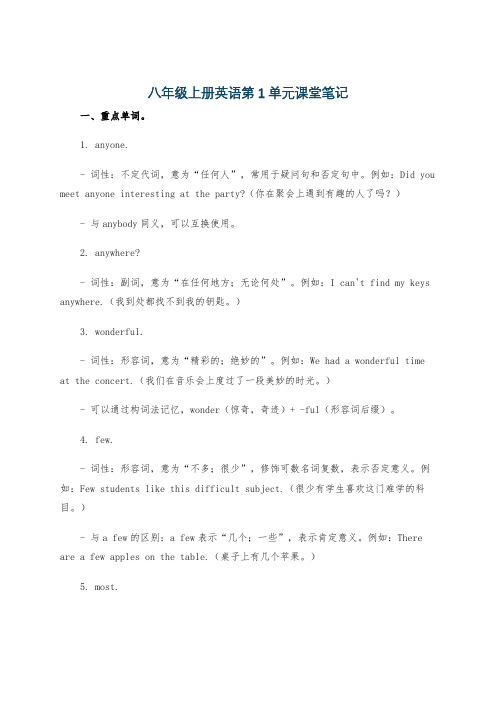
八年级上册英语第1单元课堂笔记一、重点单词。
1. anyone.- 词性:不定代词,意为“任何人”,常用于疑问句和否定句中。
例如:Did you meet anyone interesting at the party?(你在聚会上遇到有趣的人了吗?)- 与anybody同义,可以互换使用。
2. anywhere?- 词性:副词,意为“在任何地方;无论何处”。
例如:I can't find my keys anywhere.(我到处都找不到我的钥匙。
)3. wonderful.- 词性:形容词,意为“精彩的;绝妙的”。
例如:We had a wonderful time at the concert.(我们在音乐会上度过了一段美妙的时光。
)- 可以通过构词法记忆,wonder(惊奇,奇迹)+ -ful(形容词后缀)。
4. few.- 词性:形容词,意为“不多;很少”,修饰可数名词复数,表示否定意义。
例如:Few students like this difficult subject.(很少有学生喜欢这门难学的科目。
)- 与a few的区别:a few表示“几个;一些”,表示肯定意义。
例如:There are a few apples on the table.(桌子上有几个苹果。
)5. most.- 词性:形容词,意为“最多的;大多数的”;也可作名词,意为“大部分;大多数”。
例如:Most students in our class like English.(我们班大多数学生喜欢英语。
)- 作形容词时,可用于构成形容词的最高级形式,如:the most beautiful(最美丽的)。
6. something.- 词性:不定代词,意为“某事;某物”,常用于肯定句中。
例如:I have something important to tell you.(我有重要的事情要告诉你。
)- 与anything的区别:anything用于疑问句和否定句中,但在表示请求、建议或希望得到肯定回答的疑问句中也可用something。
八年级上册外研版英语书笔记

八年级上册外研版英语书笔记外研版八年级上册英语书笔记。
一、Module 1 How to learn English。
(一)重点单词。
1. pair.- n. (相关的)两个人,一对,一双。
例如:a pair of shoes(一双鞋);a pair of glasses(一副眼镜)。
- 常见搭配:in pairs(成对地,成双地)。
2. correct.- v. 改正;纠正。
例如:Please correct your mistakes.(请改正你的错误。
)- adj. 正确的,对的。
其反义词为“incorrect”。
例如:The answer is correct.(答案是正确的)。
3. spelling.- n. 拼写。
例如:Your spelling should be improved.(你的拼写应该被提高。
)4. word.- n. 单词;词;话语。
例如:Learn these words by heart.(用心学习这些单词。
);He didn't say a word.(他一句话也没说。
)5. practice.- n. 练习。
是不可数名词。
例如:We need more practice.(我们需要更多的练习。
)- v. 练习,后接名词、代词或动名词。
例如:practice speaking English(练习说英语)。
(二)重点短语。
1. look up.- 查;查找。
例如:Look up the new words in the dictionary.(在字典里查找新单词。
)2. make a mistake/make mistakes.- 犯错误。
例如:Don't be afraid of making mistakes.(不要害怕犯错误。
)3. write down.- 写下;记下。
例如:Write down your name and address.(写下你的名字和地址。
八年级英语(全年)课堂教学笔记
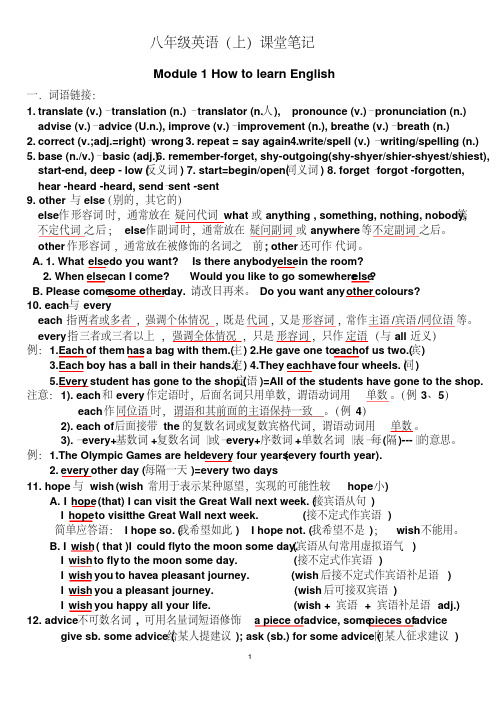
八年级英语(上)课堂笔记Module 1 How to learn English一.词语链接:1. translate (v.) – translation (n.) – translator (n.人), pronounce (v.) – pronunciation (n.) advise (v.) – advice (U.n.), improve (v.) – improvement (n.), breathe (v.) – breath (n.)2. correct (v.;adj.=right)–wrong3. repeat = say again4.write/spell (v.) – writing/spelling (n.)5. base (n./v.) – basic (adj.)6. remember-forget, shy-outgoing(shy-shyer/shier-shyest/shiest), start-end, deep - low (反义词)7. start=begin/open(同义词)8. forget –forgot -forgotten, hear -heard -heard, send –sent -sent9. other 与else(别的,其它的)else作形容词时,通常放在疑问代词what或anything , something, nothing, nobody,等不定代词之后;else作副词时,通常放在疑问副词或anywhere等不定副词之后。
other作形容词,通常放在被修饰的名词之前; other还可作代词。
A. 1. What else do you want? Is there anybody e lse in the room?2. When else can I come? Would you like to go somewhere else?B. Please come some other day. 请改日再来。
八年级上册英语笔记1~10单元

八年级上册英语笔记(1 - 10 单元)一、Unit 1 Where did you go on vacation?(一)重点词汇1.anyone /ˈeniwʌn/ 任何人-解析:用于疑问句和否定句中,表示“任何人”。
-例句:Did anyone see my keys?(有人看到我的钥匙了吗?)2.wonderful /ˈwʌndəfl/ 精彩的;极好的-解析:形容事物非常好,令人愉悦。
-例句:We had a wonderful time on vacation.(我们在假期里过得非常愉快。
)3.few /fjuː/ 很少;几乎没有-解析:修饰可数名词,表示数量少。
-例句:There are few people in the park today.(今天公园里人很少。
)4.quite a few 相当多;不少-解析:强调数量比较多。
-例句:I took quite a few photos on my trip.(我在旅行中拍了不少照片。
)5.most /məʊst/ 大多数;大部分-解析:可作形容词、名词或副词。
-例句:Most people like to travel.(大多数人喜欢旅行。
)(二)重点句型1.Where did you go on vacation? 你去哪里度假了?-解析:这是一个特殊疑问句,询问过去的动作。
-例句:Where did you go last weekend?(你上周末去哪里了?)2.Did you go anywhere interesting? 你去了什么有趣的地方吗?-解析:一般疑问句,用“Did + 主语+ 动词原形”的结构。
-例句:Did you do anything special yesterday?(你昨天做了什么特别的事情吗?)3.I went to the mountains. 我去了山区。
-解析:简单的陈述句,表达过去的动作。
八年级上册英语第五单元课堂笔记
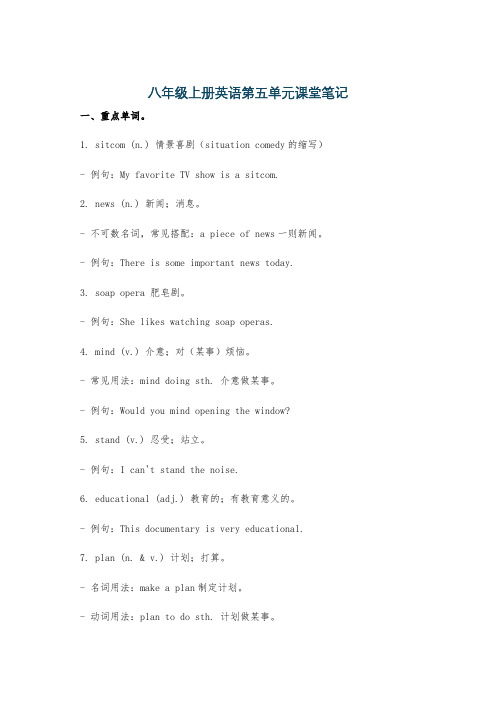
八年级上册英语第五单元课堂笔记一、重点单词。
1. sitcom (n.) 情景喜剧(situation comedy的缩写)- 例句:My favorite TV show is a sitcom.2. news (n.) 新闻;消息。
- 不可数名词,常见搭配:a piece of news一则新闻。
- 例句:There is some important news today.3. soap opera 肥皂剧。
- 例句:She likes watching soap operas.4. mind (v.) 介意;对(某事)烦恼。
- 常见用法:mind doing sth. 介意做某事。
- 例句:Would you mind opening the window?5. stand (v.) 忍受;站立。
- 例句:I can't stand the noise.6. educational (adj.) 教育的;有教育意义的。
- 例句:This documentary is very educational.7. plan (n. & v.) 计划;打算。
- 名词用法:make a plan制定计划。
- 动词用法:plan to do sth. 计划做某事。
- 例句:I plan to visit my grandparents this weekend.8. hope (v. & n.) 希望。
- 动词用法:hope to do sth. 希望做某事。
- 例句:I hope to be a doctor in the future.- hope后不能接sb. to do sth.这种形式。
9. find out 查明;弄清。
- 区别于find(找到,强调结果),find out更强调经过调查、研究等查明事情的真相。
- 例句:Can you find out when the train leaves?10. discussion (n.) 讨论;商量。
八年级上册英语课堂笔记

八年级上册课堂笔记(1-6单元)Unit 1 Where did you go on vacation1,一般过去时基本结构:主语+动词过去式+其他;否定形式:①was / were + not; ②在行为动词前加didn't,同时还原动词;一般疑问句:①Was/Were+主语+其他②Did+主语+动词原形+其他2,动词过去式规则变化:直接加ed;以不发音e结尾的单词,直接加d;以辅音字母+y结尾的,变y为i加ed;以元音字母+y结尾的,直接加ed;以重读闭音节结尾的,双写最后的辅音字母+ed不规则变化的动词过去式(见书本最后一页)3,go on vacation去度假 be on vacation在度假4,anyone任何人,只用于指人,一般用在否定句、疑问句中,后面不接of 短语。
做主语时位于动词用单数。
Eg:Is there anyone at homeany one任何一个,指人或物,后面接of 短语。
Eg:You can take any one of these books. 5,adj修饰不定代词后置 anything special something importantenough作adv,修饰adj/ adv 后置 old enough fast enoughelse作adj,修饰疑问代词和不定代词后置 what else who else something else 6,quite a few/ little 相当多7,How/ what about+V-ing/ n/ 代词…怎么样(表建议、询问)8,most students= most of the students“one of +the most +adj +n复数”表示“最…之一”Eg:He is one of the most famous writers in China.A most +adj +n 非常 Eg:Hangzhou is a most beautiful city.9,buy/ get sb sth= buy/ get sth for sb10,what do you think of/ about…= how do you like…你认为…怎么样11,have fun,enjoy oneself,have a good/ great/ wonderful time+V-ing,12,主语+ seem+(to be)+表语(n/adj) eg:Tom seems to be a smart boy/ happy.It seems that从句 eg:It seems that he understand.主语+ seem to do sth eg:He seems to understand.13,adj 以-ing结尾“令人…的”exciting,interesting,relaxing,boring 以-ed结尾“人感到…的”excited,interested,relaxed,bored14,询问价格:How much is… What’s the price of…表示价格高低:…be expensive/ cheapThe price of … is high/ low15,get to, arrive in/at, reach,到达(如果后面接地点的副词home,here或there ,就不用介词in ,at, to)16,decide(not)to dodecide that从句decide+疑问词+不定式17,try(not)to do sth尽力try doing sth 尝试try/ do one’s best to do sthtry it on试穿(动副结构) try out试验 have a try试一试18,feel like感觉像 feel like doing sth/ want to do sth/ would like to do sth19,a lot of= lots of =plenty of20,in the past在过去21,enjoy/ like doing22,感叹句:How+adj+主谓!How+adj+a/an +n单+主谓!What+ a/an +adj+ n单+主谓!What+ adj+ n复/ 不可数+主谓!23,more than=over超过 less than 少于 more or less或多或少24,wait for等待25,too many“太多”修饰可数名词复数too much“太多”修饰不可数名词much too“实在太”修饰形容词或副词26,because+从句 because of +n/ V-ing /代词27,enough作adj修饰n, enough time enough moneyhave enough…to do sth eg:I have enough time to finish the work. enough作adv修饰adj/ adv old enough fast enough…enough for sb to do sth eg:The job is easy enough for me to do. not…enough to do The book isn’t easy enough for me to read.too…to… The book is too difficult for me to read.so…that… The book is so difficult that I can’t read.28,the next day第二天29,remember/ forget+to do要做+doing做过30,Stop sb from doing sth阻止Stop to do 停下来去做其他事Stop doing 停止正在做的事31,another two hours=two more hours32,at the top of在…顶端,名列…之前强调点on the top of在…上面强调面33,find out查明,弄清 find找到(结果) look for寻找(过程)34,go on with/ doing sth继续原来的事go on to do sth继续做别的事35,so +adj +that +结果状语从句“如此……以致……”eg:I was so busy that I didn’t go to sleep for 3 days.so that 引导目的状语从句,以便,为了(in order to)eg:they got up early so that they could catch the early bus.so +adj +(a/ an+n单数)that It is so important a meeting that I can’t miss it.such+ a/ an+ adj + n单数+that It is such an important meeting that I can’t miss it.such+ adj+n复数/不可数+thatUnit 2 How often do you exercise1,How 如何(方式)how long 多长(时间)答语常用“(For/ about +)时间段”how far多远(距离)答语常用“(It’s +)数词 +miles/ meters/ kilometers”how often多久一次(频率)答语常用“Always/ often/ every day/…”或“次数+时间”等表频率的状语How soon多快,多久以后,常用在将来时中。
人教新目标英语八年级上册Unit3单元课堂笔记
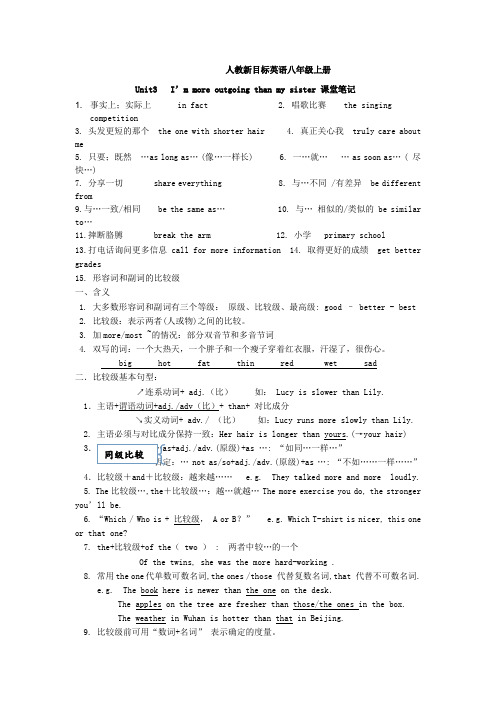
人教新目标英语八年级上册Unit3 I’m more outgoing than my sister课堂笔记1. 事实上;实际上 in fact2. 唱歌比赛 the singingcompetition3. 头发更短的那个 the one with shorter hair4. 真正关心我 truly care about me5. 只要;既然…as long as… (像…一样长)6. 一…就… … as soon as… ( 尽快…)7. 分享一切 share everything 8. 与…不同 /有差异 be different from9.与…一致/相同be the same as… 10. 与… 相似的/类似的 be similar to…11.摔断胳膊 break the arm 12. 小学 primary school13.打电话询问更多信息 call for more information 14. 取得更好的成绩 get better grades15. 形容词和副词的比较级一、含义1. 大多数形容词和副词有三个等级:原级、比较级、最高级: good – better - best2. 比较级:表示两者(人或物)之间的比较。
3. 加more/most ~的情况:部分双音节和多音节词4. 双写的词:一个大热天,一个胖子和一个瘦子穿着红衣服,汗湿了,很伤心。
big hot fat thin red wet sad二.比较级基本句型:↗连系动词+ adj.(比)如: Lucy is slower than Lily.1.主语+谓语动词+adj./adv(比)+ than+ 对比成分↘实义动词+ adv./ (比)如:Lucy runs more slowly than Lily.2. 主语必须与对比成分保持一致:Her hair is longer than yours.(→your hair)3adj./adv.(原级)+as …: “如同…一样…”not as/so+adj./adv.(原级)+as …: “不如……一样……”4.比较级+and+比较级:越来越…… e.g. They talked more and more loudly.5. The比较级…,the+比较级…:越…就越… The more exercise you do, the stronger you’ll be.6. “Which / Who is + 比较级, A or B?” e.g. Which T-shirt is nicer, this one or that one?7. the+比较级+of the( two ) : 两者中较…的一个Of the twins, she was the more hard-working .8. 常用the one代单数可数名词,the ones /those 代替复数名词,that 代替不可数名词.e.g. The book here is newer than the one on the desk.The apples on the tree are fresher than those/the ones in the box.The weather in Wuhan is hotter than that in Beijing.9. 比较级前可用“数词+名词” 表示确定的度量。
广州版英语八年级第一学期课堂笔记U4重点短语与句型

Unit 4 重点短语和句子Part One Key phrases1. in the daytime在白天2.keep...off使...不接近,远离...3.at the same time同时4.in history 在历史上5.at the start of...在...开始的时候lions of数以百万计的7.across the world世界各地8.at night在夜晚9.allow sb. to do sth.允许某人做某事10.keep in touch with与...保持联系11.as many +可数n.复数+as 与..一样多12.as much +不可数n. + as 与...一样多13.imagine doing sth.想象做某事14.at top speed of ...km/h最高时速达..km/h 15.be frightened of sth.害怕某物16.be frightened to do sth.害怕做某事17.right now此时此刻18.English-speaking country讲英语的国家19.refer to描述20.at the weekend在周末Part Two Important sentences1.Since then, people have been able to speak to each other over long distances.自从那时以来,人们就已经能够长距离地与对方说话。
2.Mobile phones allow people to keep in touch with each other anytime, anywhere.电话能让人们无论在何时何地都可以保持联系。
3. With light bulbs, people can do as many things in the evening as they can in the daytime.有了电灯泡,人们在晚上做的事情就能和在白天做的事情一样多了。
八年级上册英语课堂笔记
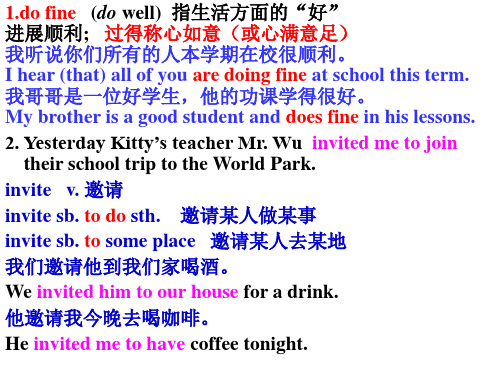
invite v. 邀请 invite sb. to do sth. 邀请某人做某事 invite sb. to some place 邀请某人去某地 我们邀请他到我们家喝酒。
Both swimming and stamp collecting are his
interests (hobbies). 上个月,父亲带我去了江苏的许多名 胜。
Last month, my father took me to many
places of interest in Jiangsu.
interesting作形容词,意为“有趣的,引起兴趣
的”,表示事物本身; interested作形容词,常用于sb. is interested in sth. 结构,意为“某人对……感兴趣”。 我对历史很感兴趣。
I’m very interested in history. 我们就不能做点更有趣的事情吗?
Can’t we do something more interesting? I am not interested in playing computer games. I have no interest in playing computer games.
1.do fine (do well) 指生活方面的“好” 进展顺利; 过得称心如意(或心满意足) 我听说你们所有的人本学期在校很顺利。 I hear (that) all of you are doing fine at school this term. 我哥哥是一位好学生,他的功课学得很好。 My brother is a good student and does fine in his lessons.
八年级上册英语课本笔记

短语/句子1.多久一次;多远how far多长时间;多久以后how long2.做锻炼do exercise3.早/ 眼操do moring/eye exercises4. 滑滑板do skateboarding 6.在周末on weekends7.一周一次once a week 8. 一年两次twice a year 9.一个月三次three times a month10.上网surf on the Internet 11.看报纸read a newspaper12.活动调查的结果the results of the activity survey 13.对于;关于as for14.对…感兴趣be interested in 15.照顾照看look after 16.垃圾/健康食品junk food17. 饮食/学习/睡眠习惯eating/studying/sleeping habits 18.尽力做某事try to do sth19.得到好的成绩get a good grade 20.在二者之间有很多不同之处be different from21.A不同于B there are many differences between A and B 22. 有点不健康a little bit unhealthy23.对某人健康好/有害be good/bad for sb. 24. 对某人态度好/不好be not good with 25. 擅长be good at 26.健康的饮食 a healthy diet 27. 从学校回家come back home from school28.健康的生活方式a healthy lifestyle 29. 保持健康keep healthy=keep in a good health30.当然of course 31. 帮助我学习更好help me (to) study better 32.和…一样be the same as33.可能maybe/may be 34.虽然我起的很早但还是迟到了。
八年级上册英语人教版笔记
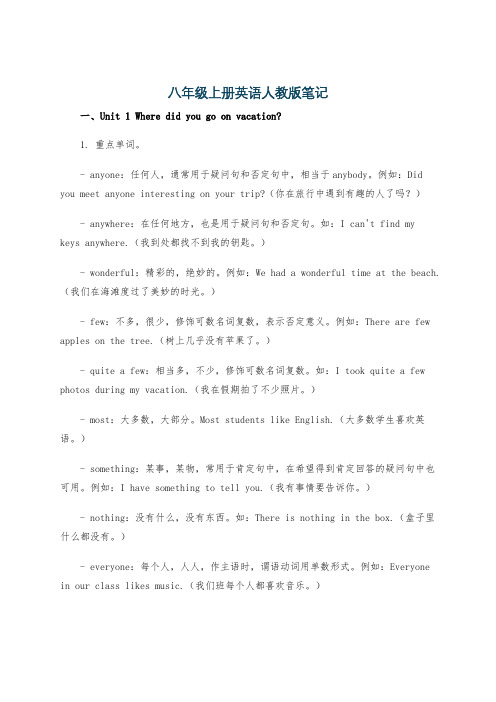
八年级上册英语人教版笔记一、Unit 1 Where did you go on vacation?1. 重点单词。
- anyone:任何人,通常用于疑问句和否定句中,相当于anybody。
例如:Did you meet anyone interesting on your trip?(你在旅行中遇到有趣的人了吗?)- anywhere:在任何地方,也是用于疑问句和否定句。
如:I can't find my keys anywhere.(我到处都找不到我的钥匙。
)- wonderful:精彩的,绝妙的。
例如:We had a wonderful time at the beach.(我们在海滩度过了美妙的时光。
)- few:不多,很少,修饰可数名词复数,表示否定意义。
例如:There are few apples on the tree.(树上几乎没有苹果了。
)- quite a few:相当多,不少,修饰可数名词复数。
如:I took quite a few photos during my vacation.(我在假期拍了不少照片。
)- most:大多数,大部分。
Most students like English.(大多数学生喜欢英语。
)- something:某事,某物,常用于肯定句中,在希望得到肯定回答的疑问句中也可用。
例如:I have something to tell you.(我有事情要告诉你。
)- nothing:没有什么,没有东西。
如:There is nothing in the box.(盒子里什么都没有。
)- everyone:每个人,人人,作主语时,谓语动词用单数形式。
例如:Everyone in our class likes music.(我们班每个人都喜欢音乐。
)- myself:我自己,是反身代词。
I can look after myself.(我能照顾自己。
人教八年级上册英语书笔记

人教八年级上册英语书笔记一、Unit 1 Where did you go on vacation?1. 重点词汇。
- anyone:任何人,用于否定句和疑问句中。
例如:Did you meet anyone interesting?- anywhere:在任何地方,与anyone用法类似。
如:I didn't go anywhere special.- wonderful:精彩的,绝妙的。
可以用来描述旅行经历等,如:We had a wonderful time in Paris.- few与a few,little与a little的区别:- few/a few修饰可数名词复数。
few表示几乎没有,a few表示有一些。
例如:There are few people in the park.(公园里几乎没有人);There are a few apples on the table.(桌子上有一些苹果)- little/a little修饰不可数名词。
little表示几乎没有,a little表示有一点。
例如:There is little water in the glass.(杯子里几乎没有水了);There is a little milk left.(还剩下一点牛奶)2. 重点句型。
- Where did you go on vacation? 这是一般过去时的特殊疑问句,用来询问过去的度假地点。
回答可以是:I went to the beach.- Did you go anywhere interesting? 这是一般过去时的一般疑问句,其肯定回答:Yes, I did. 否定回答:No, I didn't.3. 语法。
- 表示过去某个时间发生的动作或存在的状态。
- 规则动词过去式的构成:- 一般在动词原形末尾加 -ed,如:play - played。
- 以不发音的e结尾的动词加 -d,如:live - lived。
新译林版英语八年级上册第四单元课堂笔记

八年级英语课堂笔记8A Unit 4 Do It Yourself1.DIY=do it yourself 自己动手,自己做2.Here are clear instructions 这儿是清晰的指示(倒装句)Here is your new bed. 这是你的新床。
(倒装句)Here come s the bus. 公交车来了(倒装句)There go es the bell. 铃响了(倒装句)3.had better(=’d better)( not) do sth 最好(不)做…Your watch is broken. You had better buy a new one. 你的手表坏了,你最好买一新的。
You’d better not be late for school.你最好上学别迟到。
4.no problem 没问题5.Stop it. 停下来!stop working 停止工作stop to work 停下来去工作6.instead of (doing) sth. 而不是,代替Alan was ill, so I went instead.We’ll have fish instead of meat for supper today.Shall we have fish instead of meat today? 我们今天吃鱼不吃肉,好吗?Give me the red box instead of the yellow one. 把那个红盒子给我,不是这个黄色的。
We'll have tea in the garden instead of in the house. 我们将在花园里,而不在屋子里喝茶。
7.stand for 代表,表示,意味着X often stands for an unknown number. X常常代表未知数。
What does UFO stand for? UFO代表什么?8.pay someone to do it 花钱请某人做它pay for… 为…付款9.be crazy about (doing)sth… 对…着迷10.put in a brighter light 安装/放入一个更亮一些的灯put up a picture on the wall. 在墙上贴照片.(祈使句)put相关短语put out 扑灭Later some firemen came and put out the fire.put up 搭,竖立,张贴We put up our tent near a lake.put in 安装his bedroom, but he made a mistake.put away: 把(某物)放在合适的地方put on: 穿上;戴上11.He once tried to put in a brighter light in his bedroom.try 之后既可接不定式,又可接动名词,但含义上有区别。
最新八年级上册英语课堂笔记(1-6单元)

八年级上册课堂笔记(1-6单元)Unit 1 Where did you go on vacation?1,一般过去时基本结构:主语+动词过去式+其他;否定形式:①was / were + not; ②在行为动词前加didn't,同时还原动词;一般疑问句:①Was/Were+主语+其他?②Did+主语+动词原形+其他?2,动词过去式规则变化:直接加ed;以不发音e结尾的单词,直接加d;以辅音字母+y结尾的,变y为i加ed;以元音字母+y结尾的,直接加ed;以重读闭音节结尾的,双写最后的辅音字母+ed不规则变化的动词过去式(见书本最后一页)3,go on vacation去度假be on vacation在度假4,a nyone任何人,只用于指人,一般用在否定句、疑问句中,后面不接of 短语。
做主语时位于动词用单数。
Eg:Is there anyone at home?any one任何一个,指人或物,后面接of 短语。
Eg:You can take any one of these books. 5,adj修饰不定代词后置anything special something importantenough作adv,修饰adj/ adv 后置old enough fast enoughelse作adj,修饰疑问代词和不定代词后置what else who else something else 6,quite a few/ little 相当多7,How/ what about+V-ing/ n/ 代词…怎么样?(表建议、询问)8,most students= most of the students“one of +the most +adj +n复数”表示“最…之一”Eg:He is one of the most famous writers in China.A most +adj +n 非常Eg:Hangzhou is a most beautiful city.9,buy/ get sb sth= buy/ get sth for sb10,what do you think of/ about…?= how do you like…?你认为…怎么样?11,have fun,enjoy oneself,have a good/ great/ wonderful time+V-ing,12,主语+ seem+(to be)+表语(n/adj)eg:Tom seems to be a smart boy/ happy.It seems that从句eg:It seems that he understand.主语+ seem to do sth eg:He seems to understand.13,adj 以-ing结尾“令人…的”exciting,interesting,relaxing,boring以-ed结尾“人感到…的”excited,interested,relaxed,bored14,询问价格:How much is…? What’s the price of…?表示价格高低:…be expensive/ cheapThe price of …is high/ low15,get to, arrive in/at, reach,到达(如果后面接地点的副词home,here或there,就不用介词in ,at, to)16,decide(not)to dodecide that从句decide+疑问词+不定式17,try(not)to do sth尽力try doing sth 尝试try/ do one’s best to do sthtry it on试穿(动副结构)try out试验have a try试一试18,feel like感觉像feel like doing sth/ want to do sth/ would like to do sth19,a lot of= lots of =plenty of20,in the past在过去21,enjoy/ like doing22,感叹句:How+adj+主谓!How+adj+a/an +n单+主谓!What+ a/an +adj+ n单+主谓!What+ adj+ n复/ 不可数+主谓!23,more than=over超过less than 少于more or less或多或少24,wait for等待25,too many“太多”修饰可数名词复数too much“太多”修饰不可数名词much too“实在太”修饰形容词或副词26,because+从句because of +n/ V-ing /代词27,enough作adj修饰n,enough time enough moneyhave enough…to do sth eg:I have enough time to finish the work.enough作adv修饰adj/ adv old enough fast enough…enough for sb to do sth eg:The job is easy enough for me to do.not…enough to do The book isn’t easy enough for me to read.too…to…The book is too difficult for me to read.so…that…The book is so difficult that I can’t read.28,the next day第二天29,remember/ forget+to do要做+doing做过30,Stop sb from doing sth阻止Stop to do 停下来去做其他事Stop doing 停止正在做的事31,another two hours=two more hours32,at the top of在…顶端,名列…之前强调点on the top of在…上面强调面33,find out查明,弄清find找到(结果)look for寻找(过程)34,go on with/ doing sth继续原来的事go on to do sth继续做别的事35,so +adj +that +结果状语从句“如此……以致……”eg:I was so busy that I didn’t go to sleep for 3 days.so that 引导目的状语从句,以便,为了(in order to)eg:they got up early so that they could catch the early bus.so +adj +(a/ an+n单数)that It is so important a meeting that I can’t miss it.such+ a/ an+ adj + n单数+that It is such an important meeting that I can’t miss it.such+ adj+n复数/不可数+thatUnit 2 How often do you exercise?1,How如何(方式)how long多长(时间)答语常用“(For/ about +)时间段”how far多远(距离)答语常用“(It’s +)数词 +miles/ meters/ kilometers”how often多久一次(频率)答语常用“Always/ often/ every day/…”或“次数+时间”等表频率的状语How soon多快,多久以后,常用在将来时中。
八年上册英语笔记
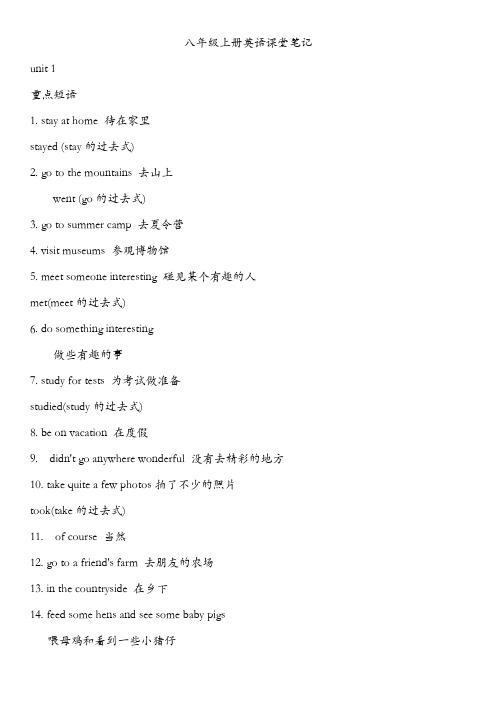
八年级上册英语课堂笔记unit 1重点短语1. stay at home 待在家里stayed (stay的过去式)2. go to the mountains 去山上went (go的过去式)3. go to summer camp 去夏令营4. visit museums 参观博物馆5. meet someone interesting 碰见某个有趣的人met(meet的过去式)6. do something interesting做些有趣的事7. study for tests 为考试做准备studied(study的过去式)8. be on vacation 在度假9. didn't go anywhere wonderful 没有去精彩的地方10. take quite a few photos拍了不少的照片took(take的过去式)11. of course 当然12. go to a friend's farm 去朋友的农场13. in the countryside 在乡下14. feed some hens and see some baby pigs喂母鸡和看到一些小猪仔fed(feed的过去式);saw(see的过去式) 15. seem to be bored 看上去很无聊It seems that... 看来……16. keep a diary/keep diaries 记日记kept(keep的过去式)17. an activity 一次活动activities(activity的复数形式)18. an expensive gift 一份昂贵的礼物19. an exciting vacation一个令人兴奋的假期20. buy sth. for sb.=buy sb. sth. 为某人买某物bought(buy的过去式)21. have a good time 玩得开心have a good time doing sth. 做某事开心22. find something enjoyable 找点乐子found(find的过去式)23. arrive in (+大地方)/arrive at (+小地方)get to (+地方)reach (+地方) 到达……24. decide to go to the beach 决定去海滩decide to do sth. 决定做某事25. try to do sth. 尽力做某事try doing sth. 尝试做某事have a try 尝试一下26. feel like sth. 感觉像某物feel like doing sth. 想做某事27. ride bicycles to sp. 骑自行车去某地rode(ride的过去式)28. a lot of new buildings 许多新建筑物29. the houses of the Chinese traders中国商人的房子30. enjoy walking around 喜欢到处走走31. walk up to the top 走到山顶32. wait over an hour for the train等火车一个多小时33. rain hard 雨下得大34. be/get wet 淋湿got(get的过去式)35. have an umbrella 有一把雨伞36. because of 因为;由于37. can't see anything below看不见下面的东西38. bring enough money 带足够的钱brought(bring的过去式)39. along the way 沿途40. another two hours=two more hours再两小时41. in the shopping center 在购物中心42. on our school trip 在我们学校郊游中43. a bag with food and water一个装着食物和水的袋子44. find out 弄清楚;查明白45. so... that...如此……以至于……46. Beijing duck 北京烤鸭47. keep doing sth. 继续做某事48. go on 继续49. jump up and down in excitement兴奋得跳上跳下50. start to come up 开始出现重点句型1. Long time no see. 好久不见。
八上英语课堂笔记人教版
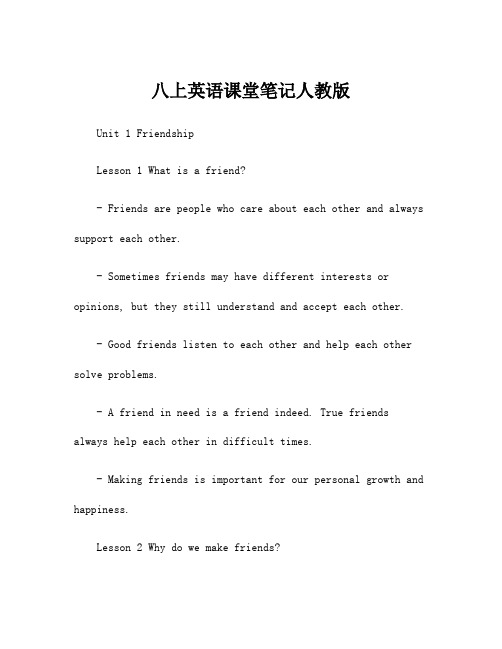
八上英语课堂笔记人教版Unit 1 FriendshipLesson 1 What is a friend?- Friends are people who care about each other and always support each other.- Sometimes friends may have different interests or opinions, but they still understand and accept each other.- Good friends listen to each other and help each other solve problems.- A friend in need is a friend indeed. True friends always help each other in difficult times.- Making friends is important for our personal growth and happiness.Lesson 2 Why do we make friends?- We make friends to share our feelings, experiences, and interests.- Friends make our lives more enjoyable and meaningful.- Friends provide emotional support and help us overcome challenges.- Through friendships, we learn important social skills, such as communication and compromise.- Friends also expand our perspectives by introducing us to new cultures and ideas.Lesson 3 How do we make friends?- We can make friends by being friendly and approachable.- Showing interest in others and being a good listener helps in building friendships.- Joining clubs, teams, or participating in activities gives us opportunities to meet new people.- Being reliable and trustworthy makes others feel comfortable around us.- Smile and be kind to everyone, as giving positive energy attracts potential friends.Lesson 4 How to be a good friend?- Good friends are loyal, trustworthy, and honest.- Offering help and support when needed strengthens the bond between friends.- Respecting each other's opinions and differences is crucial.- Giving space and understanding moments of individuality shows respect in a friendship.- Celebrating each other's successes and sharing joy fosters a positive friendship.Lesson 5 Maintaining friendships- Maintaining friendships requires effort and understanding.- Communication is important, so stay in touch and share experiences regularly.- Be forgiving and understanding when misunderstandings occur.- Compromise and find solutions when conflicts arise.- Regularly spend quality time with your friends to strengthen the bond.。
八年级上册--第一单元--课堂笔记.doc

一般现在时(1)构成:一般现在时主要用动词原形表示,主语为第三人称单数时,要用动词的第三人称单数形式,即动词词尾加-S或-es。
另外,be动词和have有特殊的人称形式。
(2)用法:①表示经常发生的动作或存在的状态,常和always, usually, often,sometimes, everyday, every week 等时间状语连用。
如He is often late for meeting. 他常常开会迟到。
They take a rest on Sundays. 他们星期天休息。
②表示客观真理。
由于是众所周知的客观事实,所以一般不用时间状语。
如The earth moves around the sun. 地球绕着太阳转。
Americans speak English. 美国人说英语。
频率副词频率副词在句中通常放在实义动词之前,be动词或助动词之后。
它们所表示的含义和频率是不同的,从高到低依次是:•always意为“总是”,表示动作的重复或状态的延续。
(always=all the time ) •usually意为“通常”,表示很少有例外。
•often意为“经常”,表示动作的重复,但不如usually那么频繁,中间有间断。
•sometimes意为“有时”,表示动作偶尔发生。
•hardly意为“几乎不”,常和ever连用表示强调。
•never意为“从未”。
(hardly和never表示否定。
)Do you know their difference?•sometimes = at times有时(一般用于一般现在时)-sometime 某个时间(一般用于将来时)•some time 一段时间•some times 几次;几倍(表示次数或倍数)I sometimes go to school by bus.我有时坐公共汽车去上学。
I will go to America sometime this year.我将要在今年的某个时候去美国。
- 1、下载文档前请自行甄别文档内容的完整性,平台不提供额外的编辑、内容补充、找答案等附加服务。
- 2、"仅部分预览"的文档,不可在线预览部分如存在完整性等问题,可反馈申请退款(可完整预览的文档不适用该条件!)。
- 3、如文档侵犯您的权益,请联系客服反馈,我们会尽快为您处理(人工客服工作时间:9:00-18:30)。
I can't wait to see her.
get off 下车
等车停下来了再下车。 Do not get off the bus until it stops. get on/off the bus get into/ out of the car get on/ off it
6、interest 1) 名词,令人感兴趣的事或人;兴趣,爱 好。places of interest表示“名胜,景点”。 游与集邮都是他的爱好。
We invited him to our house for a drink. 他邀请我今晚去喝咖啡。
He invited me to have coffee tonight.
3. join 参加,加入,指加入某一种组织政体,党派,团 体,人群等,成为其中一员,后接名词或代词 become a member of. 而 join in=take part in,意为参加某种活动。 我哥哥去年入了党。
My brother___________ the Party last year. 我上周参加了校运动会。
Last week, I ________ __________ the school sports meeting. join the club; join our school trip; join the army/ Party; join us join in the football match take part in our game/ activities…
的”,表示事物本身; interested作形容词,常用于sb. is interested in sth. 结构,意为“某人对……感兴趣”。 我对历史很感兴趣。
I’m very interested in history. 我们就不能做点更有趣的事情吗?
Can’t we do something more interesting? I am not interested in playing computer games. I have no interest in playing computer games.
5. All of us couldn’t wait to get off the bus. can’t wait to do sth. 迫不及待地做某事 can’t wait for sth.
我迫不及待地想了解考试结果。 I can't wait to learn the result of the exam. 我急于去看她。
7. Go and see for yourselves! for oneself 为了自己,亲自 by oneself 独自地,独立地=alone
你不能只为了自己而活着。 You shouldn’t live just for yourself.
我独自一个人做了这件事。 I did it by myself.
2. Yesterday Kitty’s teacher Mr. Wu invited me to join their school trip to the World Park.
invite v. 邀请 invite sb. to do sth. 邀请某人做某事 invite sb. to some place 邀请某人去某地 我们邀请他到我们家喝酒。
Both swimming and stamp collecting are his
interests (hobbies). 上个月,父亲带我去了江苏的许多名 胜。
Last month, my father took me to many
places of interest in Jiangsu.
interesting作形容词,意为“有趣的,引起兴趣
4. We finally arrived at the park.
arrive表示“到达某地”时,后面要接 介词,到达大地点用in;小地点多用at。
我们到了巴黎。 We arrived in Paris. 我们到了车站。 We arrived at the station. get to sp; arrive at/ in sp; reach sp get here/ there/home; arrive here/ there/ home; 昨晚你什么时候到的? When did you arrive yesterday evening? reach后要加地点
